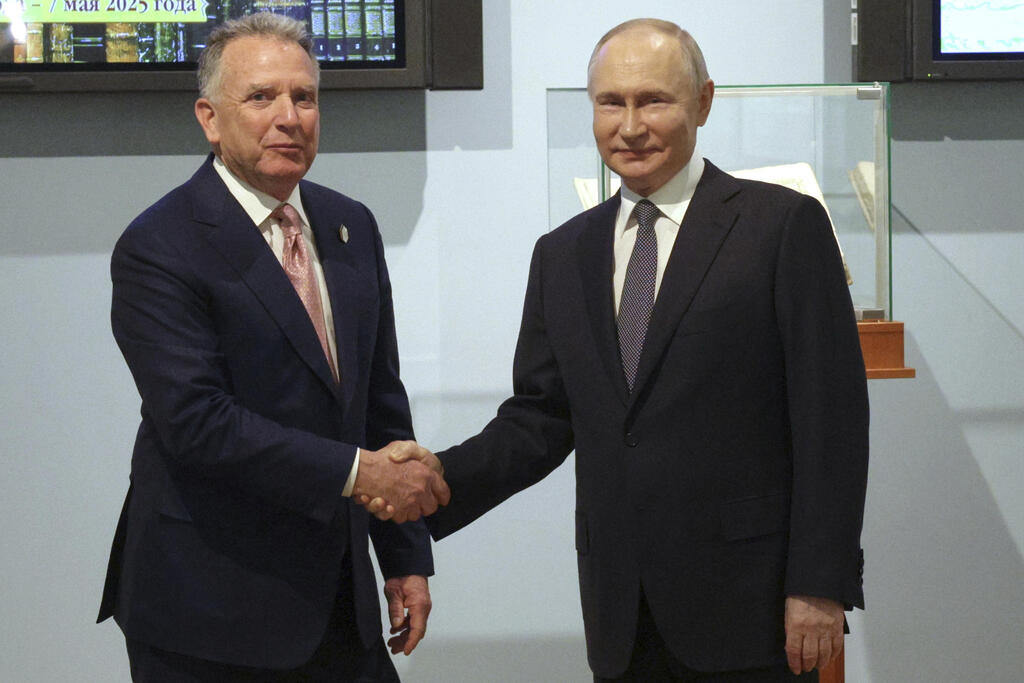Getting your Trinity Audio player ready...
It’s not often that a seasoned Iranian diplomat, a millionaire American real estate lawyer, and a Gulf prince-turned-mediator find themselves in the same room trying to solve one of the world’s most volatile crises. Yet this is exactly the scene unfolding in the latest attempt to restart nuclear negotiations between the United States and Iran.
Abbas Araghchi, Iran’s foreign minister, has been here before. He played a leading role in the 2015 nuclear deal—one later scrapped by President Donald Trump. Now, he’s back at the table. Across from him is Steve Witkoff, Trump’s envoy for negotiations on Iran, Gaza and Russia. Known more for golf deals than geopolitics, Witkoff is a Trump confidant and real estate attorney. Between them is Oman’s foreign minister, Badr al-Busaidi, the steady hand of a seasoned intermediary.
2 View gallery


Oman’s foreign minister Badr al-Busaidi meeting with his Iranian counterpart Abbas Araghchi
(Photo: Reuters)
On paper, this trio seems mismatched. In person, they’re all roughly the same age, fluent in English and surprisingly upbeat about their prospects. This weekend, they met in Muscat, Oman’s capital, for the first direct Iran-U.S. contact in nine years.
The fact that they met at all is news. Iran’s Supreme Leader Ali Khamenei, in a rare public acknowledgment, admitted that Tehran was “in dialogue with the American enemy.” He also cautioned the Iranian public not to get their hopes up: “We know who we’re dealing with, and there’s every chance no understanding will be reached.”
Khamenei still hasn’t forgiven Trump for the 2020 assassination of Qassem Soleimani, the commander of Iran’s Quds Force and one of his most trusted lieutenants. In a televised address, Khamenei swore never to forgive what he called “the vile murderers.” The bitterness hasn’t faded, and it looms over every word of diplomacy.
The talks were not without confusion. Iranian officials insisted they would not meet face to face. Trump said they would. In the end, al-Busaidi shuttled messages back and forth four times before finally ushering the two delegation leaders into a joint room. The meeting lasted “a few minutes,” Tehran said. “Longer than that,” said Washington. Both sides were free to claim victory.
Still, something shifted. Witkoff described the talks as “constructive.” Araghchi said the Iranian side “saw real determination” from the Americans and is “learning how to manage the next round.” Al-Busaidi went so far as to call the atmosphere “friendly enough to bridge differences.”
Behind the scenes, Iran is demanding economic relief from the U.S. and Europe and the lifting of sanctions. So far, neither has materialized. But optimism, at least rhetorically, seems to be holding.
There are important caveats. Israeli officials insist the military option remains on the table. Trump, never one for subtlety, made clear that if diplomacy stalls, the U.S. will consider military action. That message was received loudly in Tehran.
For now, however, Araghchi maintains Iran’s nuclear ambitions are strictly civilian. Witkoff, to the frustration of Prime Minister Benjamin Netanyahu, isn’t demanding a full dismantling of Iran’s program. Instead, he’s calling for slowing enrichment, restoring international inspections, and granting access to all nuclear facilities.
Get the Ynetnews app on your smartphone: Google Play: https://bit.ly/4eJ37pE | Apple App Store: https://bit.ly/3ZL7iNv
Iran, perhaps sensing a narrow window of opportunity, has expressed “openness” to limiting uranium enrichment. But without tangible economic incentives, it’s unlikely to concede much.
The next round of talks is set for Saturday in an undisclosed European city. Al-Busaidi will return, ready to facilitate. Round one outlined the limits of the possible. Round two may reveal whether a path to agreement exists.
 Smadar PerryPhoto: Yariv Katz
Smadar PerryPhoto: Yariv KatzSkeptics abound, particularly in the Arab world. One Egyptian diplomat put it bluntly: “Trump already got burned once by Iranian promises. Someone should remind him: You don’t make the same mistake twice. The Iranians will not give up their military nuclear capability.”
Maybe not. But for now, the unlikely trio of Araghchi, Witkoff and al-Busaidi is talking—and that, in itself, is a step.


